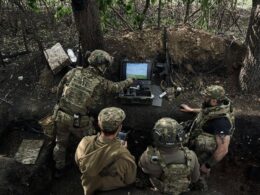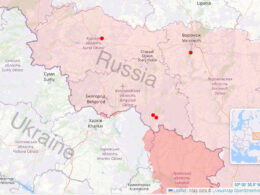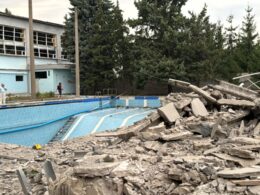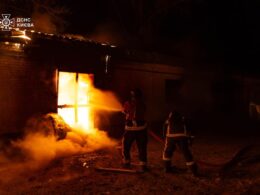Update: we’ve reached out to the frontline unit that used the “hydrogen bomb” drone, and found out that this technology has been in use for over 18 months:
3 August 2024. Today there are a lot of updates from the Kharkiv direction.
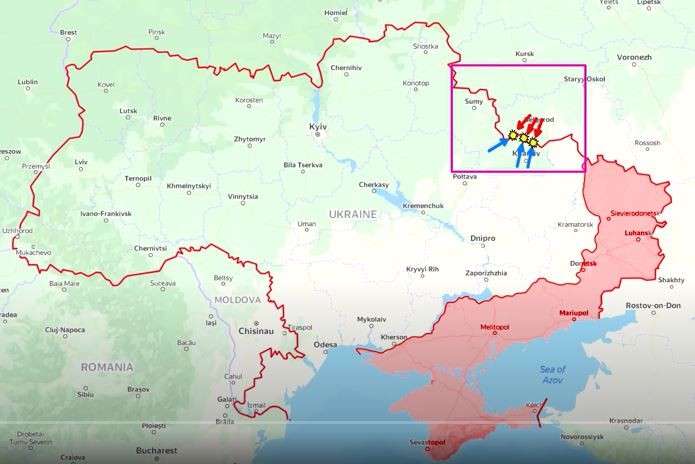
The most interesting updates come from the area of Vovchansk.

Here, after successfully driving Russians out of their bridgehead to the south, the Ukrainians amplified their operations by deploying the newest ground drones equipped with powerful bombs, erasing the Russian positions.

The Russian forces in Vovchansk failed in their offensive to advance south of the town, suffering severe losses that forced them to retreat north of the Vovcha River. This setback effectively put the Russians on the defensive, with a limited number of troops holding positions primarily at the Aggregate Plant. In theory, the combination of the plant and the river should have provided strong defensive positions. However, the Ukrainians managed to identify several key vulnerabilities.
To advance further into the northern part of Vovchansk, the Ukrainians had to exploit these vulnerabilities to compromise the Russian defenses at the Aggregate Plant. The plant provides the Russian fighters with a highly elevated position that overlooks most of the town.

By suppressing Russian forces at the Aggregate Plant, the Ukrainian fighters could advance along Sobornaya Street with reduced resistance. This suppression would enable them to link up with troops advancing from Haharina and Shevchenko Streets, effectively cutting off the Russian stronghold at the Aggregate Plant once again.
Suppressing the Russian positions at the plant was a challenging task for the Ukrainian fighters. Previous guided bomb strikes on the plant by the Ukrainian Air Force were no longer possible due to a shortage of foreign military aid. Regular aerial drones also had limited effectiveness due to their small explosive charges.

For this reason, Ukrainian fighters in the area had to improvise using a highly innovative method to successfully destroy the Russian firing positions at the plant. They salvaged parts from wrecked civilian electric cars to create drones and bombs. Batteries and alternators from electric vehicles like Teslas were repurposed as power sources for drones, helping to sustain the Ukrainian drone force. This resourceful approach enabled them to overcome the limitations imposed by the shortage of foreign military aid and maintain pressure on the Russian positions.
Given the circumstances of the battle of Vovchansk and the disruption of operations by Russian electronic warfare systems, the Ukrainians had to adopt a different approach. They decided to use spare parts from wrecked electric vehicles to create an innovative bomb. This bomb was built using a fully loaded hydrogen fuel cell from a wrecked Toyota Mirai car and weighed over two hundred kilograms. It was capable of inflicting severe damage on Russian defenses, comparable to an aerial bomb.

The hydrogen composition of the bomb enabled it to generate powerful blast waves, fireballs, debris, and mushroom clouds. Since drones were compromised by electronic warfare and the bomb was too heavy for aerial drone delivery, the Ukrainians opted to use a remotely operated ground drone to transport the bomb to the Russian positions.
The ground drone carrying the bomb was sent over a narrow, intact section of a partially destroyed bridge along Metalista Street, just wide enough for the drone to traverse.

The bridge’s location to the east of the Aggregate Plant, coupled with the nearby trees that blocked the Russians’ view, prevented the drone from being detected. After crossing the bridge, the drone moved towards the first building to the west within the Aggregate Plant complex.
As the drone approached the building, the bomb detonated, resulting in a powerful explosion that caused significant structural damage.
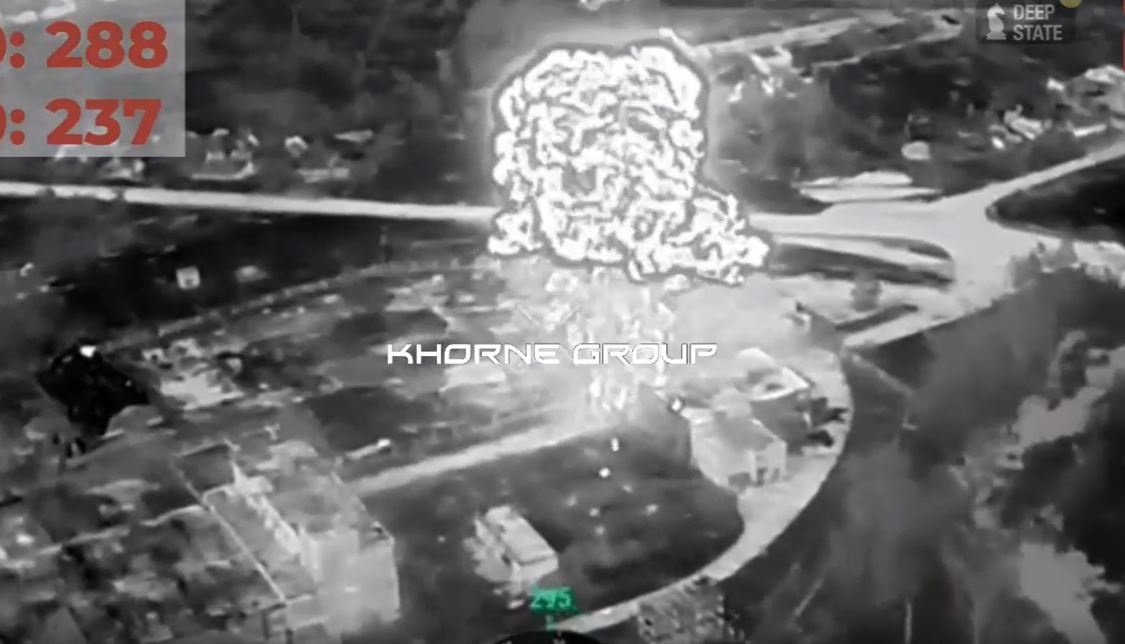
The blast was followed by a fire, suggesting that the Russians may have been storing ammunition in the building, which likely contributed to the intensity of the explosion. The original, uncensored combat footage of this incredible operation can be found on Reporting From Ukraine’s Telegram channel.
https://twitter.com/Deepstate_UA/status/1817640662365503883/
Moreover, this building was the sole Russian firing position that defended the eastern part of the Aggregate Plant from Ukrainian assaults.
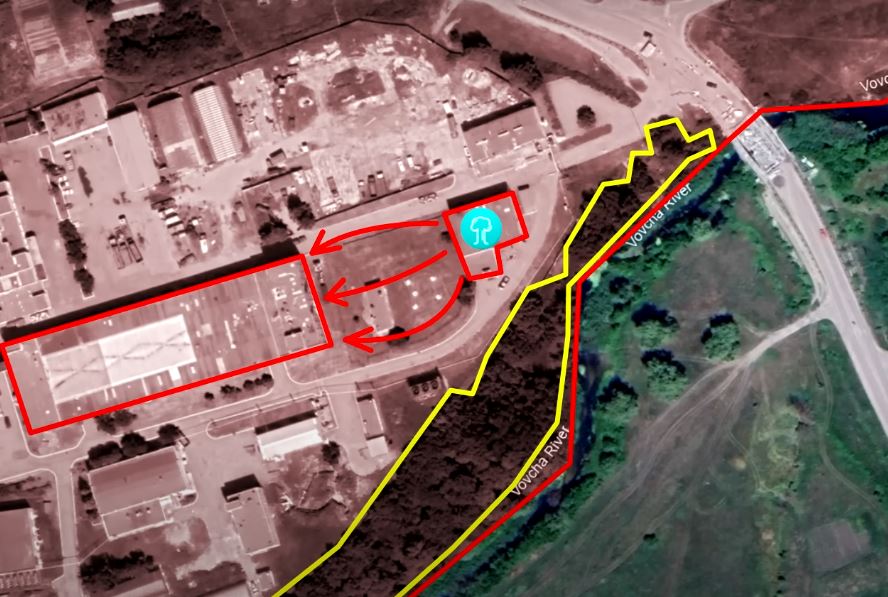
The powerful bomb detonation forced the Russian troops to abandon the building due to the extensive damage and fires, leaving it in a contested state. This strike compelled Russian forces in the area to shift their focus to the building, anticipating a potential Ukrainian assault to capture it.

The Russian command was aware that if the Ukrainians seized the abandoned position, they could station dozens, if not up to a hundred, troops inside. This would enable the Ukrainians to use the building as a staging ground for further assaults on the Aggregate Plant, a crucial position that the Russians were determined to protect at all costs. While the Russian forces were distracted at the Aggregate Plant, the redeployment of troops left a gap along Soborna Street.

Ukrainian fighters swiftly exploited this vulnerability, seizing control of undefended sections of the street. This oversight further strained the Russian logistical situation, as they lost control of a key supply route to their main force. Although Russian troops could still move through houses connecting small sections of Shevchenkova and Haharina Streets under their control, this situation could lead to the further collapse of their positions, potentially resulting in their eventual expulsion from Vovchansk.

Overall, the Ukrainians managed to make a gap in Russian defenses by decimating their positions with powerful bomb detonation that managed to set in motion a broader operation to retake the town. In recognition of the recent achievements by Ukrainian fighters in the area, President Zelensky and members of the Ukrainian High Command visited Vovchansk. The President personally awarded distinguished Ukrainian fighters with state honors and expressed his gratitude for their successful and professional execution of combat missions.
In our daily frontline report, we pair up with the military blogger Reporting from Ukraine to keep you informed about what is happening on the battlefield in the Russo-Ukrainian war.


